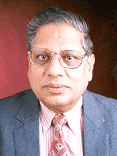Keynote Speakers
Bridging the Information Divide: Challenges & Opportunities

Abstract:
A large part of our world still does not have meaningful Internet access. The gap between those who have
quick and easy access to information versus those who do not has created the information divide. Those
who have easy access to information generally make better decisions about their livelihood and well-being.
Although a symptom of deeper socio-economic issues, appropriate technologies and government policies that
take end-user constraints into account can help alleviate this problem. In this talk, I will discuss
research challenges and describe technologies that enable ubiquitous connectivity and services. These
technologies range from connecting rural villages in remote areas to monitoring the health of individuals
and improving social interactions between people. I will describe a programmable mobile platform that
enables researchers to build and distribute such applications quickly. The problem space is large and
complex; to succeed, we have to work together to build affordable technologies that empower the individual.
Biography:
Victor Bahl Victor Bahl is a Senior Researcher
and Manager of the Networking Research Group in Microsoft Research. His research interests span he areas of
wireless networking & mobile computing. Some of his seminal research includes: WiLIB (1997-1998), a
general purpose programming interface for wireless network cards; RADAR (1998-1999), a signal strength
based indoor user-location determination system; CHOICE (1999-2001), a edge-server based public area
wireless hot-spot network, and UCOM (2001-2003), a multi-radio wireless system. Dr. Bahl's research has
been incorporated into Microsoft's Windows Operating Systems product and numerous non-Microsoft commercial
products. In addition to building systems, he has authored over 70 scientific papers and 50 patent
applications. He is the founder and Chairman of the ACM Special Interest Group in Mobility (SIGMOBILE);
the founder and past Editor-in-Chief of ACM Mobile Computing and Communications Review (1996-2001), and
the founder and Steering Committee Chair of ACM/USENIX Mobile Systems Conference (MobiSys); In addition to
ACM MobiSys, Dr. Bahl serves on the Steering Committee of IEEE DySpan, ACM SenSys, ACM MobiCom, IEEE ISWC
and on the Technical Program Committee of over 50 international conferences and workshops. He is on the
board of several IEEE and ACM journals. He has received Digital's Doctoral Engineering Award and ACM
SIGMOBILE's Distinguished Service Award. He is a Fellow of the ACM, a Senior Member of IEEE, and a past
president of the electrical engineering honor society Eta Kappa Nu-Zeta Pi.
Plenary Speakers
Why use Aggregate Logical Sensor Units for large Sensor Networks?

Dharma P. Agrawal
OBR Research Center for Distributed and Mobile Computing
Electrical & Computer Engineering and Computer Science
University of Cincinnati, Cincinnati, OH 45221-0030, USA
|
Abstract: Conserving energy has become the prime objective in any large sensor network. We
introduce a new paradigm of moving away from such a constraint and advocate the use of an aggregate
logical sensor unit as a building block. Our objective is to successfully support desired operations in an
underlying application. This paradigm shift may be feasible if a group of off-the-shelf sensor nodes could
constitute a logical unit and possess adequate computing power, built-in reliability and cost-effective
distributed functionality. Such a drastic departure in sensor network design is not easy and we highlight
various critical issues involved in such an implementation.
Biography: Dharma P. Agrawal is the Ohio Board of Regents Distinguished Professor of Computer
Science and Computer Engineering and the Director of the OBR Research Center for Distributed and Mobile
Computing in the department of Electrical, Computer Engineering and Computer Science (ECECS), University
of Cincinnati, OH. He has been a faculty member at Wayne State University, (1977-1982) and North Carolina
State University, (1982-1998). He received a B.E. in Electrical Engineering from Ravishanker University,
Raipur, India, in 1966, M.E. (Honors) in Electronics and Communication Engineering from the University of
Roorkee, Roorkee (now IIT Roorkee), India, in 1968, and the D. Sc. Technology degree in Electrical
Engineering from the Swiss Federal Institute of Technology, Lausanne, Switzerland, in 1975. He has
published over 400 papers in the areas of Parallel System Architecture, Multicomputer Networks, Routing
Techniques, Parallelism Detection and Scheduling Techniques, Reliability of Real-Time Distributed Systems,
Modeling of C-MOS Circuits, and Computer Arithmetic and Wireless and Mobile Systems. His recent research
interests include energy efficient multipath routing, middleware and query processing in sensor networks,
security in ad hoc and sensor networks, analytical enhancements in IEEE 802.11 protocol, efficient channel
partitioning in integrated wireless networks, multicasting in integrated wireless networks, interference
mitigation between Bluetooth and 802.11, routing in scatternet, ad hoc network intrusion detection,
distributed key management, advanced routing techniques for heterogeneous wireless networks, and use of
smart multibeam directional antennas for enhanced QoS.
He has been very active professionally. He has been Program Chair and General Chair for many conferences
and has delivered keynote speech for 5 international conferences. He has received numerous awards from the
IEEE Computer Society, including the Third Millennium Medal. In 1994, as the Chair of the Technical
Committee on Computer Architecture, IEEE Computer Society, he started a new symposium on High Performance
Computer Architecture and has become most important meeting for the research community. Recently, he took
an initiative in starting a new meeting in Mobile Ad hoc and Sensor Systems area, MASS-2004 held in Fort
Lauderdale, October 24-27, 2004. His recent co-authored text book entitled, "Introduction to Wireless and
Mobile Systems," has been widely accepted throughout the world and the second edition has just been
published. He has four approved patents and fourteen patent filings in the area of wireless cellular
networks. He is Fellow of the IEEE, ACM, AAAS, and WIF. Contact him at dpa@ececs.uc.edu.
Last updated: 21 May 05
 2nd International Symposium on
2nd International Symposium on  2nd International Symposium on
2nd International Symposium on